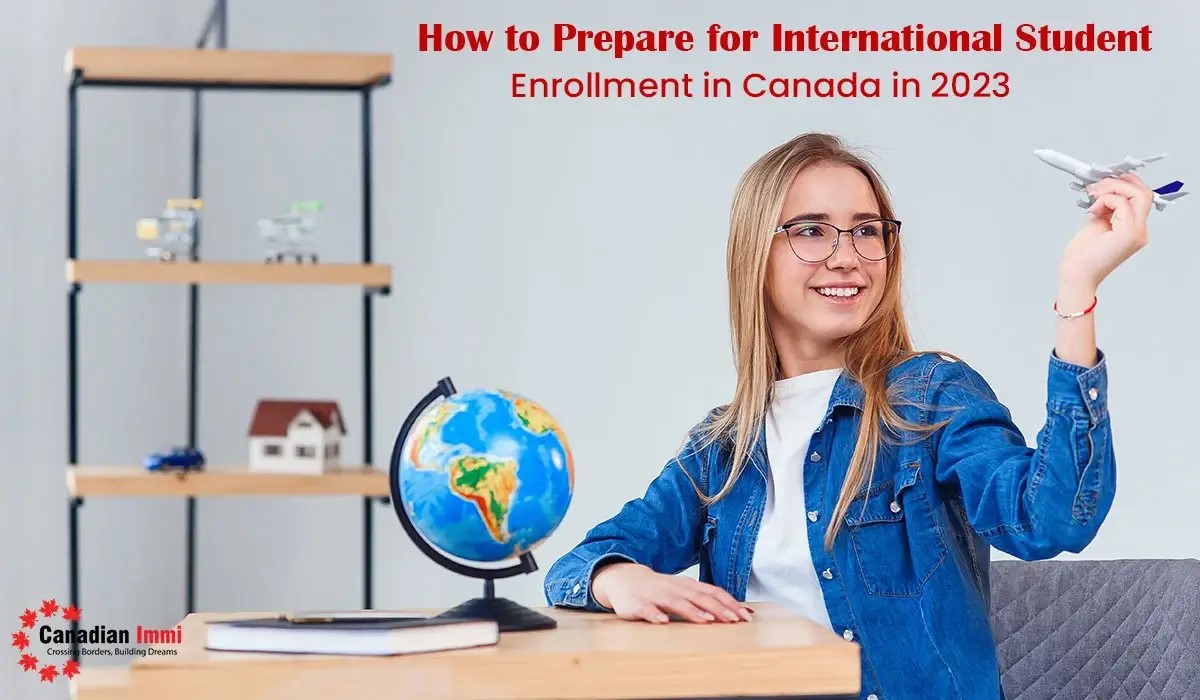Introduction:
Canada’s reputation as a welcoming and diverse destination for international students remains strong in 2023. With its high-quality education system, vibrant multicultural communities, and stunning landscapes, it’s no wonder that students from around the world are eager to pursue their academic dreams in the Great White North. If you’re considering joining this esteemed group of international students, it’s essential to prepare effectively. This article will guide you through the crucial steps to ensure a smooth transition as you prepare for your International Student enrollment in Canada in 2023.
1.Research Your Study Options:
Begin by researching the Canadian universities and colleges that offer the programs aligned with your academic and career goals. Look into the course structures, faculty expertise, and research opportunities. Make a list of the institutions that resonate with your aspirations.
2.Check Admission Requirements:
Each institution will have specific admission requirements, including academic qualifications, language proficiency (usually English or French), and standardized test scores (such as IELTS, TOEFL, GRE, or GMAT). Review these requirements early on to ensure you have ample time to prepare and meet them.
3.Financial Planning:
Studying abroad involves financial considerations, including tuition fees, living expenses, health insurance, and potential travel costs. Research scholarships, grants, and part-time work opportunities available to international students in Canada to ease your financial burden.
4. Apply for Study Permits:
In this guide, we’ll walk you through the process of applying for a study permit, ensuring that you’re well-prepared to embark on your educational adventure in the Great White North.
1. Know Your Eligibility:
Before you start the application process, ensure that you meet the eligibility criteria for a study permit. You generally need the following:
An acceptance letter from a DLI
Evidence of enough price range to cowl tuition expenses, dwelling fees, and go back transportation No criminal report (a police certificates is probably required)
Good health (a medical exam might be necessary)
Intent to leave Canada after completing your studies
2. Gather Required Documents:
Collect all the required and important document for being International Student that are highly required during process. This may include your passport, acceptance letter from the DLI, proof of funds, passport-sized photos, and language proficiency test scores (like IELTS or TOEFL).
3. Apply Online or via VAC:
The recommended method to apply for a study permit is online through the Immigration, Refugees, and Citizenship Canada (IRCC) website. You can also apply through a Visa Application Center (VAC) in your country, if available.
4. Create an Online Account:
If you are applying online, create an sperate account on the IRCC website. You’ll need to provide accurate personal information and supporting documents.
5. Fill Out the Application Form:
Complete the study permit application form (IMM 1294). Make sure to reply all questions honestly and accurately. Review your answers before submitting.
6. Pay the Application Fee:
Pay the required application fee online using a credit or debit card. Keep the payment receipt for your records.
7. Biometrics Appointment (if applicable):
Relying for your country of residence, you may want to provide biometrics (fingerprints and image). Follow the instructions provided after submitting your application.
8. Attend a Visa Interview (if required):
In some cases, you may be asked to attend a visa interview at your local Canadian embassy or consulate. Prepare by reviewing your application and supporting documents.
9. Wait for Processing:
The processing time for study permit applications varies, so be patient. You can check the status of your application online using the application number provided.
10. Receive Your Study Permit:
Once your application is approved, you’ll receive a Port of Entry (POE) Letter of Introduction and a study permit. The POE letter explains the conditions of your entry to Canada, and you’ll need to show it to the immigration officer when you arrive.
11. Prepare for Your Journey:
Before leaving for Canada, ensure you have all your documents in order, including your passport, study permit, and the POE letter. Familiarize yourself with Canada’s entry requirements and quarantine regulations, if applicable.
5.Arrange Accommodation:
Start looking for suitable housing options near your chosen institution. Many universities offer on-campus housing, while off-campus options include apartments and homestays. Secure your accommodation early to ease your transition to Canada.
6.Healthcare and Insurance:
Canada offers a world-class healthcare system, but international students often need additional health insurance. Research and arrange medical coverage that suits your needs, as well as any health requirements for your study permit.
7.Cultural and Social Preparation:
Learn about Canadian culture, customs, and etiquette. Familiarize yourself with the local laws and regulations to ensure a smooth adjustment. Join social media groups or forums where current international students share their experiences and tips.
8.Pack Essentials
Pack clothing suitable for Canada’s varying weather conditions, including warm clothing for the winters. Don’t forget to bring important documents like your passport, study permit, acceptance letter, and any academic transcripts.
9.Connect with Alumni:
Reach out to alumni from your chosen institution. They can provide valuable insights into campus life, the local community, and how to make the most of your time in Canada.
10.Embrace Diversity:
Canada is celebrated for its diverse and inclusive environment. Embrace opportunities to engage with people from different cultures and backgrounds, both on and off-campus.
11.Prepare Mentally and Emotionally for being International Student:
Leaving home to study in a new country can be both exciting and challenging. Prepare yourself mentally and emotionally for the changes you’ll experience being International Student, and seek support from friends, family, and on-campus resources when needed.
Conclusion:
As you prepare for International Student enrollment in Canada in 2023, remember that planning and thorough research are key to a successful transition. From understanding admission requirements to embracing cultural diversity, each step contributes to your overall experience. Canada offers not only a top-notch education but also a chance to immerse yourself in a rich multicultural tapestry that will shape your academic and personal journey. So, pack your enthusiasm, curiosity, and a willingness to learn – your Canadian adventure awaits!

